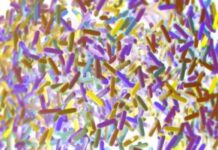Traumatic Life Events, Not Genetics or Chemical Imbalance Cause Depression and Anxiety
Researchers from three U.K. Universities analyzed the responses of 32,827 people to online questionnaires, finding that social deprivation and traumatic or abusive life-experiences strongly...
Benzos Fail to Prevent, May Increase PTSD
In a review of the evidence regarding benzodiazepines, researchers from the University of Michigan find that benzodiazepines used in the treatment of PTSD are...
Food Insecurity Linked to Mental Health Globally
Global analysis of 149 countries finds food insecurity is associated with poorer mental health.
Overprescribing of Benzodiazepines
Norwegian researchers found that 14.6% (27,861) of patients who were prescribed benzodiazepines used two simultaneously, despite the fact that all benzodiazepines have essentially the...
Individuals With Low Incomes More Likely to Have Chronic Pain
Findings show that participants with lower levels of education and SES suffer from more chronic pain.
Economic Policy Uncertainty Linked to Higher Suicide Rates in Men
A new study, published in Social Indicators Research, investigates the association between economic policy uncertainty and suicide rates in the US.
A Traumatic Experience Can Reshape Your Microbiome
From Science of Us: A recent study suggests that our guts may harbor evidence of traumatic life experiences many years after the fact, impacting our...
New Study Explores Approaches to Discontinuing Antidepressants
Psychiatrist and psychologist outline pharmacological and psychotherapeutic strategies for discontinuing antidepressants.
Little Victories on Breezy
In my most recent blog post, “The Unmedicated Life”, I attempted to answer a question I’m frequently asked by other survivors — “How did you get better from psychiatric medication damage/withdrawal?” But there is also a part two to the question that I didn’t address, which is, “How did you know when you were better?”
Kelly McGonigal: How to Make Stress Your Friend
This TED Talk sheds new light on stress. "... While stress has been made into a public health enemy, new research suggests that stress...
People Are Hacking Antidepressant Doses to Avoid Withdrawal
From New Scientist: Some organizations are helping people hack their dosing regimens so they can taper off psychiatric drugs without severe withdrawal effects. One Dutch organization...
Anxiety Accounts for Bipolar False Positives
Researchers found that of 1,534 patients assessed at Australia's Black Dog Institute Depression clinic, a significant number received a false positive diagnosis of bipolar...
Study Finds Phone Apps Effective for Reducing Mental Health Symptoms
Researchers found that participants using coach-assisted apps designed for depression and anxiety experienced symptom reductions in both conditions
Benzo Drugs, UK Fudge, Cover Up and Consequences
In 1980, the British Medical Journal published a “Systematic Review of the Benzodiazepines” by the Committee on the Review of Medicines. The committee denied the addictive potential of Benzodiazepines and limited their suggestions to short term use. The results have been devastating.
Anxiety: The Price We Pay for Consciousness
In his NY Times article “A Drug to Cure Fear,” Richard Friedman noted: “It has been an article of faith in neuroscience and psychiatry that, once formed, emotional memories are permanent.” This has not been a principle of these disciplines, including clinical psychology, for many years. Consolidation-reconsolidation-extinction models have been around for some time now, applied in particular to persons suffering from traumatic memories; e.g., Holocaust survivors, war and genocide survivors, etc.
No New Prozacs: A Dry Pipeline for New Psychiatric Drugs
In 1988, the introduction of Prozac was hailed as a breakthrough in the treatment of depression. A quarter of a century later, the prospect of a similar breakthrough in psychiatric medications seems remote. On August 19, 2013, the New York Times ran an article called, “A Dry Pipeline for Psychiatric Drugs".
Generalized Anxiety Disorder Does Not Meet Criteria for a Disorder
Researchers in Italy found that of 105 subjects who met criteria for the DSM diagnosis of generalized anxiety disorder (GAD), only 18 had no...
Stress Associated With Brain Shrinkage in Healthy People
In studies of healthy people experiencing stress, Yale researchers found tissue loss in brain areas regulating emotion, self-control and other behaviors.
Read more ...
4 Reasons Gratitude is Good for You
From USA Today: Gratitude has been shown to have both physical and mental health benefits. Here are a few ways to cultivate our feelings of gratitude...
“Why Does Psychiatry So Often Get a Free Pass on Standards of Evidence?”
Rob Wipond takes HealthNewsReview.org to task for its coverage of a Philadelphia Inquirer article about a medical device designed for people experiencing panic. He writes that “hyperbolic psychiatric and psychological claims frequently get free passes from otherwise thoughtful medical critics.”
How Come the Word “Antipsychiatry” is so Challenging?
So here we go again; another meeting with another young person who describes how he is in an acute crisis - you may call it - and is diagnosed and prescribed neuroleptics. He is told by the doctor that he suffers from a life-long illness and he will from now on be dependent on his “medication.” As long as people are met this way I see no alternative than showing that there are alternatives. If that means being "antipsychiatry," then I am more than happy to define myself and our work in that way.
Depression, Anxiety, PTSD: The Mental Impact of Climate Change
From CNN: The growing climate change crisis is leading to various types of trauma, including increased natural disasters, economic loss for farmers, and forced migration, all...
Colleges Get Proactive in Addressing Depression on Campus
From The New York Times: The number of college students with mental health concerns is rapidly increasing, straining many universities' mental health and counseling centers. Colleges...
Fear is Life Force … (in Clinical Circles it’s Often Called Anxiety) – An...
It’s not just in spiritual circles but also in psychiatric and mental health circles that fear and anxiety are too often medicated away instead of worked with. It’s not easy to work with it and a lot of professionals don’t know how to hold such space for such courageous facing of the dark parts of psyche and so many people don’t learn that it’s actually possible. For those of us who’ve come off psych drugs and faced severe psychiatric drug withdrawal syndrome it becomes a necessary and often heinously difficult initiation . . . Learning to embrace my experience and surrender to it was the way through for me.
The Upside of Neuroticism
From Pacific Standard: A new study from the U.K. suggests that there may be an upside to neuroticism - some neurotic people live longer lives....




















